Impact of Ineffective Stakeholder Management on Organizational Procedures: A Case Study on Tesco
VerifiedAdded on 2023/06/15
|13
|2794
|347
AI Summary
This research aims to evaluate the impact of ineffective stakeholder management on organizational procedures in Tesco. The research objectives include examining the importance of stakeholder management, analyzing tools used for effective stakeholder management, and determining challenges faced when using stakeholder management strategies. The methodology includes both inductive and deductive approaches, descriptive and exploratory research design, and primary and secondary data collection methods. Ethical considerations include informed consent, confidentiality, and avoiding deceptive practices.
Contribute Materials
Your contribution can guide someone’s learning journey. Share your
documents today.
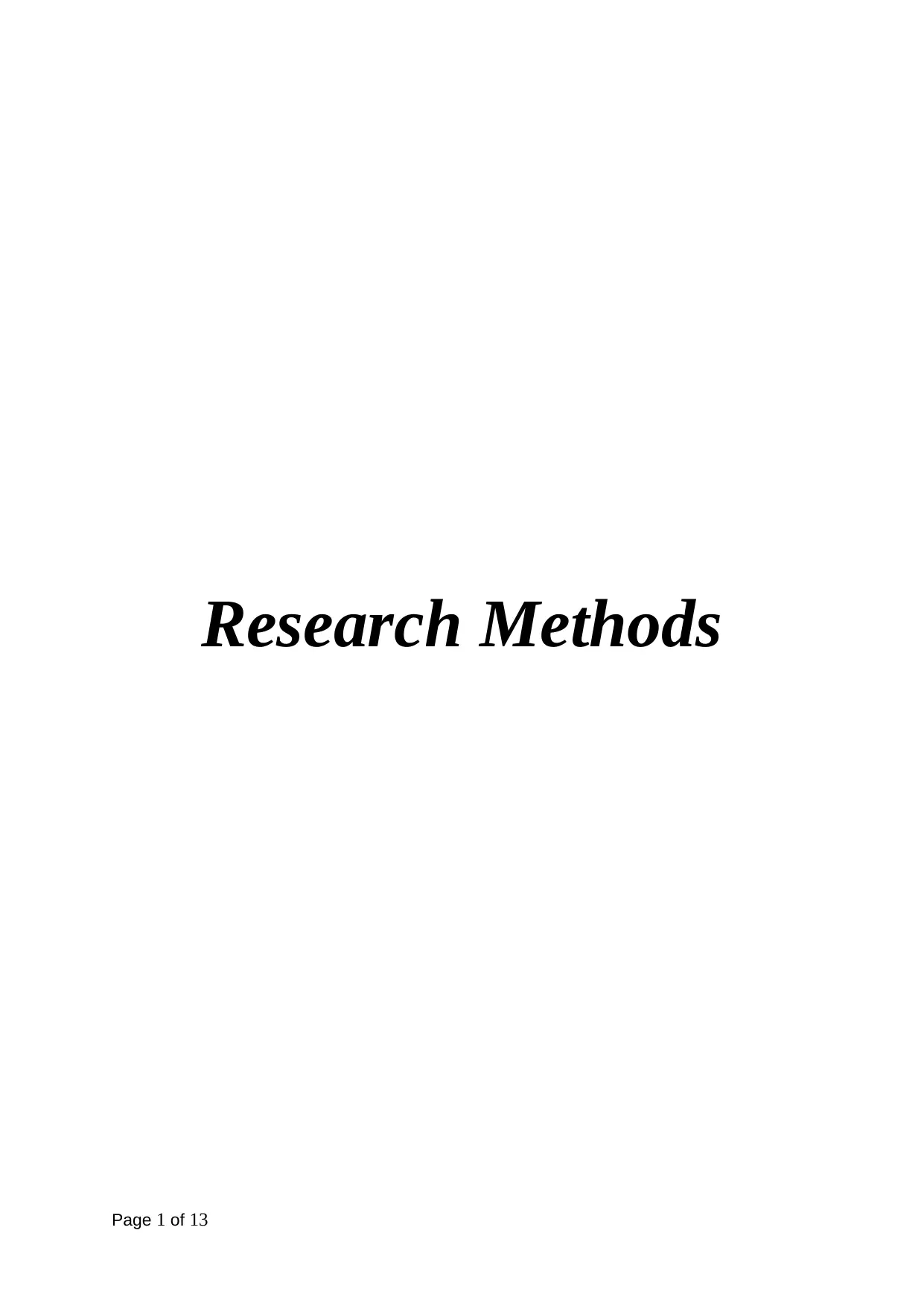
Research Methods
Page 1 of 13
Page 1 of 13
Secure Best Marks with AI Grader
Need help grading? Try our AI Grader for instant feedback on your assignments.

Table of Contents
1. RESEARCH AIM..................................................................................................................3
2. RESEARCH OBJECTIVES..................................................................................................3
3. METHODOLOGY.................................................................................................................3
4. ETHICAL CONSIDERATIONS...........................................................................................4
5. REFERENCES.......................................................................................................................6
6. ETHICAL CHECKLIST........................................................................................................7
Page 2 of 13
1. RESEARCH AIM..................................................................................................................3
2. RESEARCH OBJECTIVES..................................................................................................3
3. METHODOLOGY.................................................................................................................3
4. ETHICAL CONSIDERATIONS...........................................................................................4
5. REFERENCES.......................................................................................................................6
6. ETHICAL CHECKLIST........................................................................................................7
Page 2 of 13
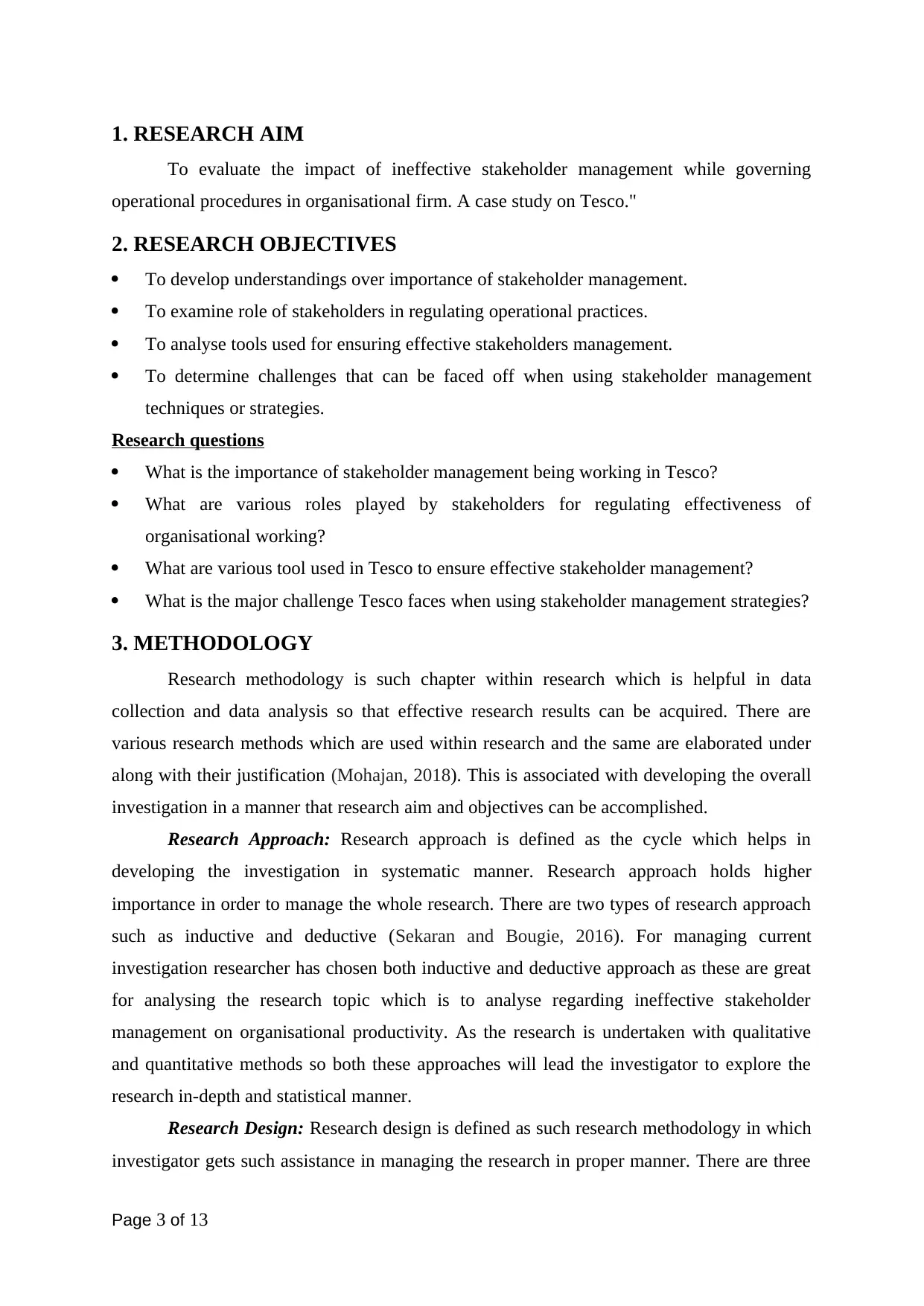
1. RESEARCH AIM
To evaluate the impact of ineffective stakeholder management while governing
operational procedures in organisational firm. A case study on Tesco."
2. RESEARCH OBJECTIVES
To develop understandings over importance of stakeholder management.
To examine role of stakeholders in regulating operational practices.
To analyse tools used for ensuring effective stakeholders management.
To determine challenges that can be faced off when using stakeholder management
techniques or strategies.
Research questions
What is the importance of stakeholder management being working in Tesco?
What are various roles played by stakeholders for regulating effectiveness of
organisational working?
What are various tool used in Tesco to ensure effective stakeholder management?
What is the major challenge Tesco faces when using stakeholder management strategies?
3. METHODOLOGY
Research methodology is such chapter within research which is helpful in data
collection and data analysis so that effective research results can be acquired. There are
various research methods which are used within research and the same are elaborated under
along with their justification (Mohajan, 2018). This is associated with developing the overall
investigation in a manner that research aim and objectives can be accomplished.
Research Approach: Research approach is defined as the cycle which helps in
developing the investigation in systematic manner. Research approach holds higher
importance in order to manage the whole research. There are two types of research approach
such as inductive and deductive (Sekaran and Bougie, 2016). For managing current
investigation researcher has chosen both inductive and deductive approach as these are great
for analysing the research topic which is to analyse regarding ineffective stakeholder
management on organisational productivity. As the research is undertaken with qualitative
and quantitative methods so both these approaches will lead the investigator to explore the
research in-depth and statistical manner.
Research Design: Research design is defined as such research methodology in which
investigator gets such assistance in managing the research in proper manner. There are three
Page 3 of 13
To evaluate the impact of ineffective stakeholder management while governing
operational procedures in organisational firm. A case study on Tesco."
2. RESEARCH OBJECTIVES
To develop understandings over importance of stakeholder management.
To examine role of stakeholders in regulating operational practices.
To analyse tools used for ensuring effective stakeholders management.
To determine challenges that can be faced off when using stakeholder management
techniques or strategies.
Research questions
What is the importance of stakeholder management being working in Tesco?
What are various roles played by stakeholders for regulating effectiveness of
organisational working?
What are various tool used in Tesco to ensure effective stakeholder management?
What is the major challenge Tesco faces when using stakeholder management strategies?
3. METHODOLOGY
Research methodology is such chapter within research which is helpful in data
collection and data analysis so that effective research results can be acquired. There are
various research methods which are used within research and the same are elaborated under
along with their justification (Mohajan, 2018). This is associated with developing the overall
investigation in a manner that research aim and objectives can be accomplished.
Research Approach: Research approach is defined as the cycle which helps in
developing the investigation in systematic manner. Research approach holds higher
importance in order to manage the whole research. There are two types of research approach
such as inductive and deductive (Sekaran and Bougie, 2016). For managing current
investigation researcher has chosen both inductive and deductive approach as these are great
for analysing the research topic which is to analyse regarding ineffective stakeholder
management on organisational productivity. As the research is undertaken with qualitative
and quantitative methods so both these approaches will lead the investigator to explore the
research in-depth and statistical manner.
Research Design: Research design is defined as such research methodology in which
investigator gets such assistance in managing the research in proper manner. There are three
Page 3 of 13
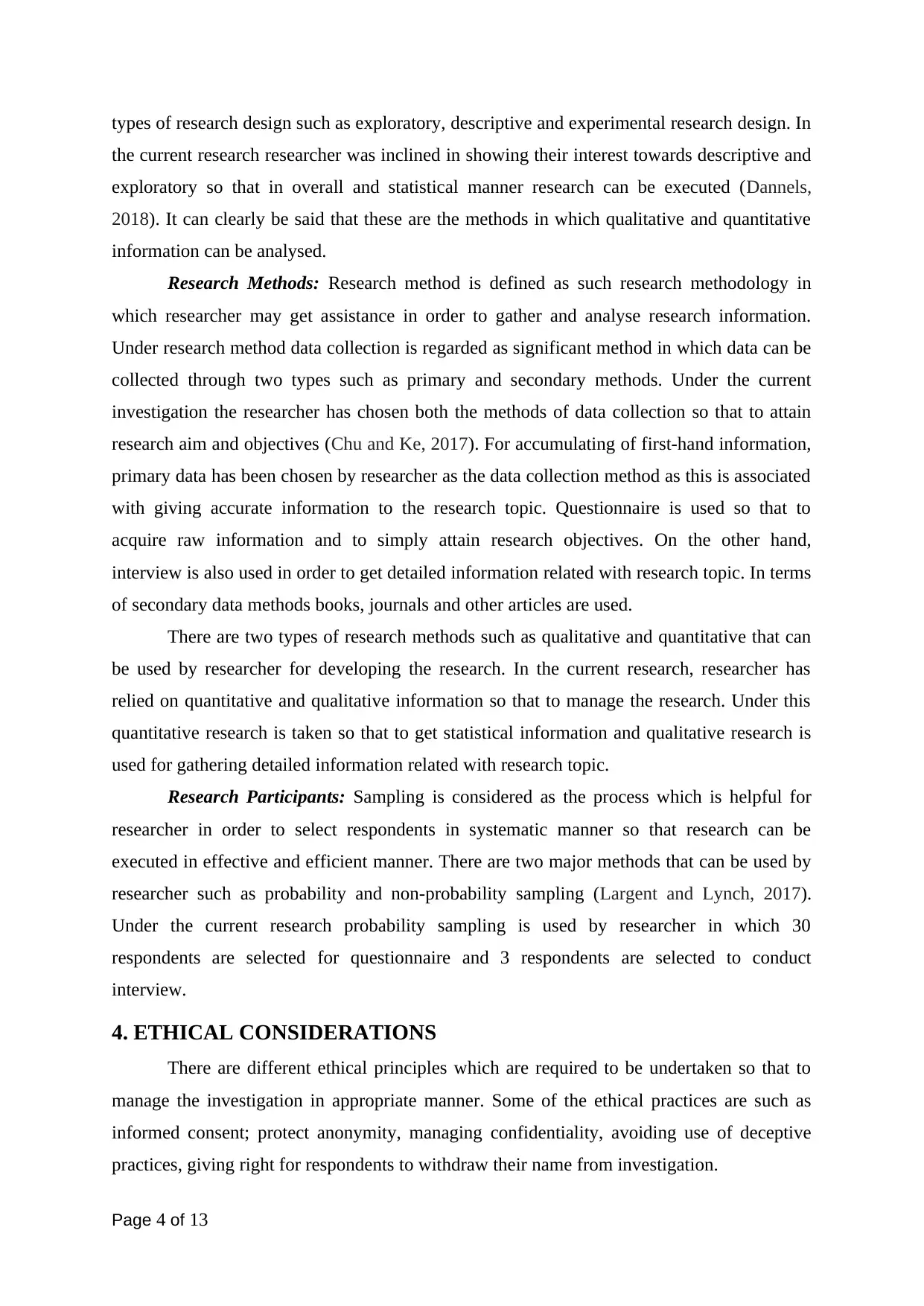
types of research design such as exploratory, descriptive and experimental research design. In
the current research researcher was inclined in showing their interest towards descriptive and
exploratory so that in overall and statistical manner research can be executed (Dannels,
2018). It can clearly be said that these are the methods in which qualitative and quantitative
information can be analysed.
Research Methods: Research method is defined as such research methodology in
which researcher may get assistance in order to gather and analyse research information.
Under research method data collection is regarded as significant method in which data can be
collected through two types such as primary and secondary methods. Under the current
investigation the researcher has chosen both the methods of data collection so that to attain
research aim and objectives (Chu and Ke, 2017). For accumulating of first-hand information,
primary data has been chosen by researcher as the data collection method as this is associated
with giving accurate information to the research topic. Questionnaire is used so that to
acquire raw information and to simply attain research objectives. On the other hand,
interview is also used in order to get detailed information related with research topic. In terms
of secondary data methods books, journals and other articles are used.
There are two types of research methods such as qualitative and quantitative that can
be used by researcher for developing the research. In the current research, researcher has
relied on quantitative and qualitative information so that to manage the research. Under this
quantitative research is taken so that to get statistical information and qualitative research is
used for gathering detailed information related with research topic.
Research Participants: Sampling is considered as the process which is helpful for
researcher in order to select respondents in systematic manner so that research can be
executed in effective and efficient manner. There are two major methods that can be used by
researcher such as probability and non-probability sampling (Largent and Lynch, 2017).
Under the current research probability sampling is used by researcher in which 30
respondents are selected for questionnaire and 3 respondents are selected to conduct
interview.
4. ETHICAL CONSIDERATIONS
There are different ethical principles which are required to be undertaken so that to
manage the investigation in appropriate manner. Some of the ethical practices are such as
informed consent; protect anonymity, managing confidentiality, avoiding use of deceptive
practices, giving right for respondents to withdraw their name from investigation.
Page 4 of 13
the current research researcher was inclined in showing their interest towards descriptive and
exploratory so that in overall and statistical manner research can be executed (Dannels,
2018). It can clearly be said that these are the methods in which qualitative and quantitative
information can be analysed.
Research Methods: Research method is defined as such research methodology in
which researcher may get assistance in order to gather and analyse research information.
Under research method data collection is regarded as significant method in which data can be
collected through two types such as primary and secondary methods. Under the current
investigation the researcher has chosen both the methods of data collection so that to attain
research aim and objectives (Chu and Ke, 2017). For accumulating of first-hand information,
primary data has been chosen by researcher as the data collection method as this is associated
with giving accurate information to the research topic. Questionnaire is used so that to
acquire raw information and to simply attain research objectives. On the other hand,
interview is also used in order to get detailed information related with research topic. In terms
of secondary data methods books, journals and other articles are used.
There are two types of research methods such as qualitative and quantitative that can
be used by researcher for developing the research. In the current research, researcher has
relied on quantitative and qualitative information so that to manage the research. Under this
quantitative research is taken so that to get statistical information and qualitative research is
used for gathering detailed information related with research topic.
Research Participants: Sampling is considered as the process which is helpful for
researcher in order to select respondents in systematic manner so that research can be
executed in effective and efficient manner. There are two major methods that can be used by
researcher such as probability and non-probability sampling (Largent and Lynch, 2017).
Under the current research probability sampling is used by researcher in which 30
respondents are selected for questionnaire and 3 respondents are selected to conduct
interview.
4. ETHICAL CONSIDERATIONS
There are different ethical principles which are required to be undertaken so that to
manage the investigation in appropriate manner. Some of the ethical practices are such as
informed consent; protect anonymity, managing confidentiality, avoiding use of deceptive
practices, giving right for respondents to withdraw their name from investigation.
Page 4 of 13
Secure Best Marks with AI Grader
Need help grading? Try our AI Grader for instant feedback on your assignments.
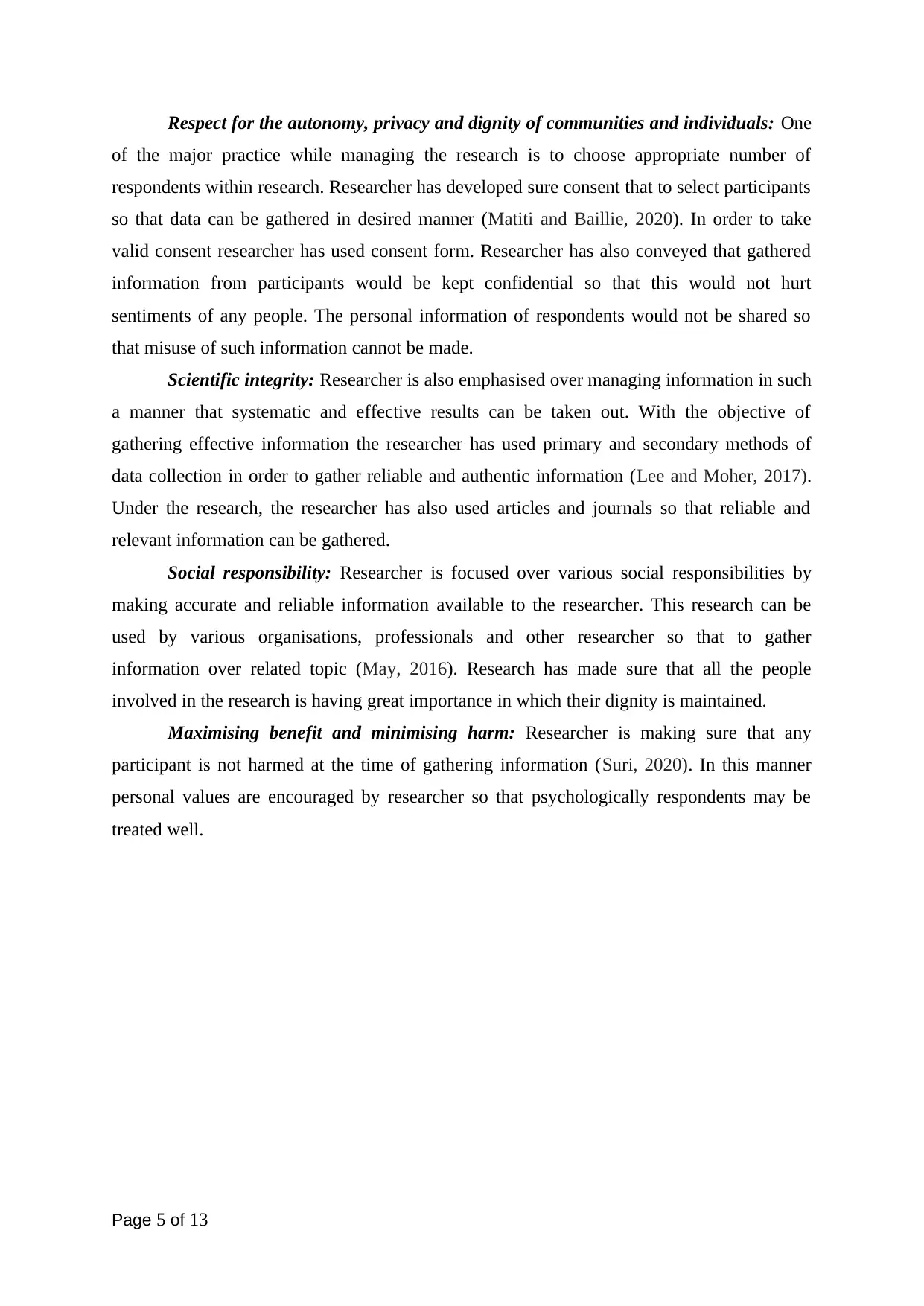
Respect for the autonomy, privacy and dignity of communities and individuals: One
of the major practice while managing the research is to choose appropriate number of
respondents within research. Researcher has developed sure consent that to select participants
so that data can be gathered in desired manner (Matiti and Baillie, 2020). In order to take
valid consent researcher has used consent form. Researcher has also conveyed that gathered
information from participants would be kept confidential so that this would not hurt
sentiments of any people. The personal information of respondents would not be shared so
that misuse of such information cannot be made.
Scientific integrity: Researcher is also emphasised over managing information in such
a manner that systematic and effective results can be taken out. With the objective of
gathering effective information the researcher has used primary and secondary methods of
data collection in order to gather reliable and authentic information (Lee and Moher, 2017).
Under the research, the researcher has also used articles and journals so that reliable and
relevant information can be gathered.
Social responsibility: Researcher is focused over various social responsibilities by
making accurate and reliable information available to the researcher. This research can be
used by various organisations, professionals and other researcher so that to gather
information over related topic (May, 2016). Research has made sure that all the people
involved in the research is having great importance in which their dignity is maintained.
Maximising benefit and minimising harm: Researcher is making sure that any
participant is not harmed at the time of gathering information (Suri, 2020). In this manner
personal values are encouraged by researcher so that psychologically respondents may be
treated well.
Page 5 of 13
of the major practice while managing the research is to choose appropriate number of
respondents within research. Researcher has developed sure consent that to select participants
so that data can be gathered in desired manner (Matiti and Baillie, 2020). In order to take
valid consent researcher has used consent form. Researcher has also conveyed that gathered
information from participants would be kept confidential so that this would not hurt
sentiments of any people. The personal information of respondents would not be shared so
that misuse of such information cannot be made.
Scientific integrity: Researcher is also emphasised over managing information in such
a manner that systematic and effective results can be taken out. With the objective of
gathering effective information the researcher has used primary and secondary methods of
data collection in order to gather reliable and authentic information (Lee and Moher, 2017).
Under the research, the researcher has also used articles and journals so that reliable and
relevant information can be gathered.
Social responsibility: Researcher is focused over various social responsibilities by
making accurate and reliable information available to the researcher. This research can be
used by various organisations, professionals and other researcher so that to gather
information over related topic (May, 2016). Research has made sure that all the people
involved in the research is having great importance in which their dignity is maintained.
Maximising benefit and minimising harm: Researcher is making sure that any
participant is not harmed at the time of gathering information (Suri, 2020). In this manner
personal values are encouraged by researcher so that psychologically respondents may be
treated well.
Page 5 of 13
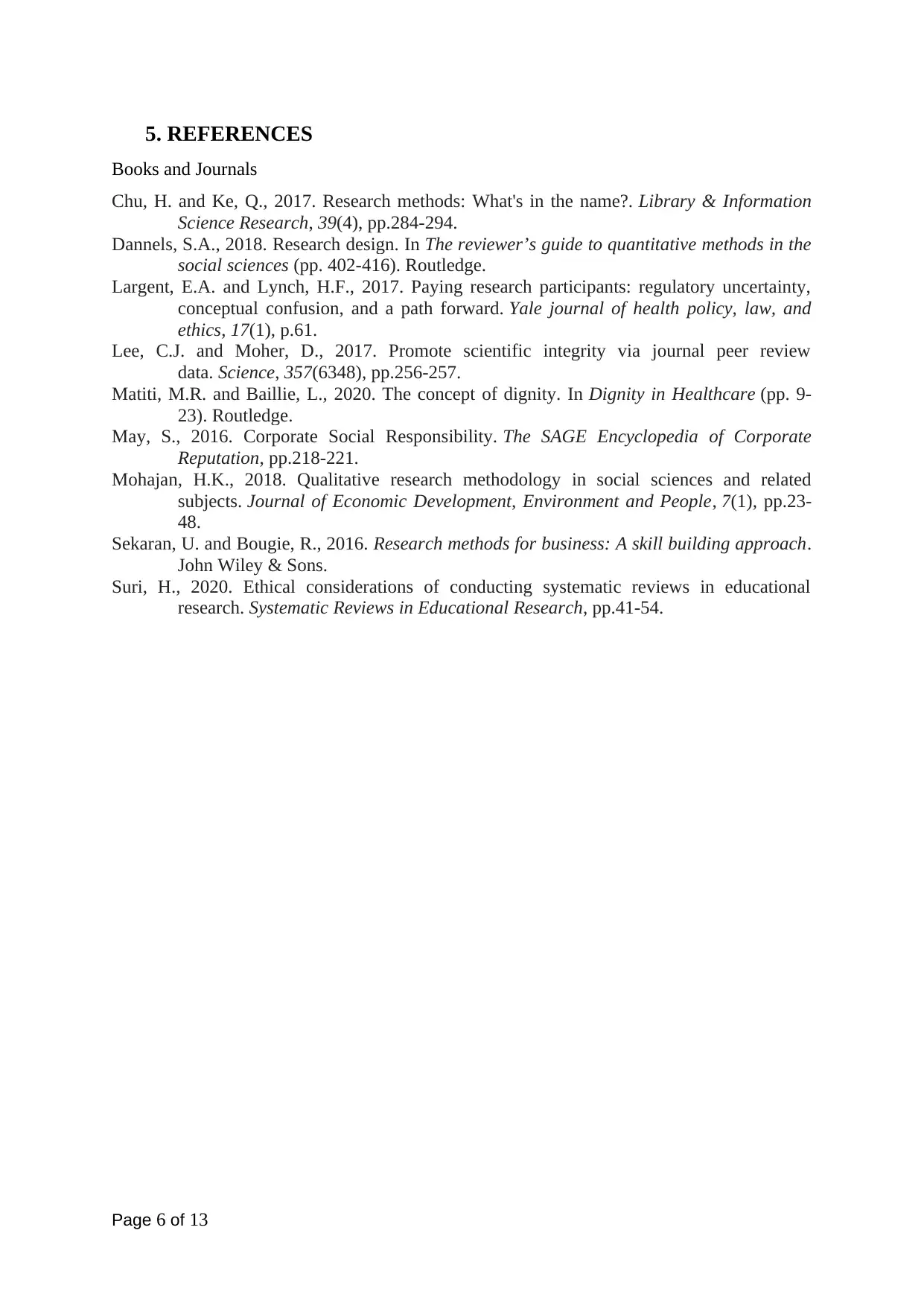
5. REFERENCES
Books and Journals
Chu, H. and Ke, Q., 2017. Research methods: What's in the name?. Library & Information
Science Research, 39(4), pp.284-294.
Dannels, S.A., 2018. Research design. In The reviewer’s guide to quantitative methods in the
social sciences (pp. 402-416). Routledge.
Largent, E.A. and Lynch, H.F., 2017. Paying research participants: regulatory uncertainty,
conceptual confusion, and a path forward. Yale journal of health policy, law, and
ethics, 17(1), p.61.
Lee, C.J. and Moher, D., 2017. Promote scientific integrity via journal peer review
data. Science, 357(6348), pp.256-257.
Matiti, M.R. and Baillie, L., 2020. The concept of dignity. In Dignity in Healthcare (pp. 9-
23). Routledge.
May, S., 2016. Corporate Social Responsibility. The SAGE Encyclopedia of Corporate
Reputation, pp.218-221.
Mohajan, H.K., 2018. Qualitative research methodology in social sciences and related
subjects. Journal of Economic Development, Environment and People, 7(1), pp.23-
48.
Sekaran, U. and Bougie, R., 2016. Research methods for business: A skill building approach.
John Wiley & Sons.
Suri, H., 2020. Ethical considerations of conducting systematic reviews in educational
research. Systematic Reviews in Educational Research, pp.41-54.
Page 6 of 13
Books and Journals
Chu, H. and Ke, Q., 2017. Research methods: What's in the name?. Library & Information
Science Research, 39(4), pp.284-294.
Dannels, S.A., 2018. Research design. In The reviewer’s guide to quantitative methods in the
social sciences (pp. 402-416). Routledge.
Largent, E.A. and Lynch, H.F., 2017. Paying research participants: regulatory uncertainty,
conceptual confusion, and a path forward. Yale journal of health policy, law, and
ethics, 17(1), p.61.
Lee, C.J. and Moher, D., 2017. Promote scientific integrity via journal peer review
data. Science, 357(6348), pp.256-257.
Matiti, M.R. and Baillie, L., 2020. The concept of dignity. In Dignity in Healthcare (pp. 9-
23). Routledge.
May, S., 2016. Corporate Social Responsibility. The SAGE Encyclopedia of Corporate
Reputation, pp.218-221.
Mohajan, H.K., 2018. Qualitative research methodology in social sciences and related
subjects. Journal of Economic Development, Environment and People, 7(1), pp.23-
48.
Sekaran, U. and Bougie, R., 2016. Research methods for business: A skill building approach.
John Wiley & Sons.
Suri, H., 2020. Ethical considerations of conducting systematic reviews in educational
research. Systematic Reviews in Educational Research, pp.41-54.
Page 6 of 13

6. ETHICAL CHECKLIST
Page 7 of 13
Page 7 of 13
Paraphrase This Document
Need a fresh take? Get an instant paraphrase of this document with our AI Paraphraser
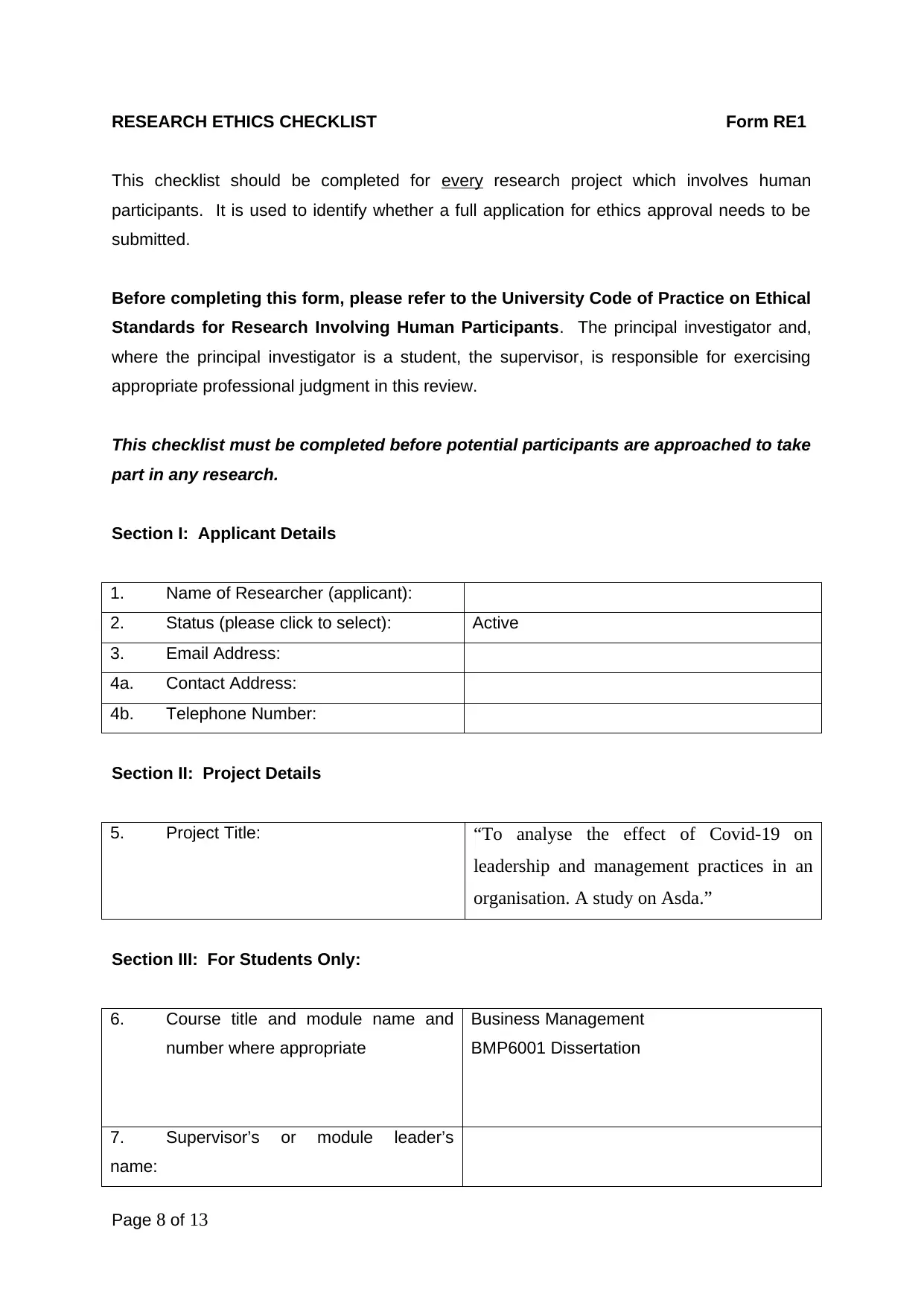
RESEARCH ETHICS CHECKLIST Form RE1
This checklist should be completed for every research project which involves human
participants. It is used to identify whether a full application for ethics approval needs to be
submitted.
Before completing this form, please refer to the University Code of Practice on Ethical
Standards for Research Involving Human Participants. The principal investigator and,
where the principal investigator is a student, the supervisor, is responsible for exercising
appropriate professional judgment in this review.
This checklist must be completed before potential participants are approached to take
part in any research.
Section I: Applicant Details
1. Name of Researcher (applicant):
2. Status (please click to select): Active
3. Email Address:
4a. Contact Address:
4b. Telephone Number:
Section II: Project Details
5. Project Title: “To analyse the effect of Covid-19 on
leadership and management practices in an
organisation. A study on Asda.”
Section III: For Students Only:
6. Course title and module name and
number where appropriate
Business Management
BMP6001 Dissertation
7. Supervisor’s or module leader’s
name:
Page 8 of 13
This checklist should be completed for every research project which involves human
participants. It is used to identify whether a full application for ethics approval needs to be
submitted.
Before completing this form, please refer to the University Code of Practice on Ethical
Standards for Research Involving Human Participants. The principal investigator and,
where the principal investigator is a student, the supervisor, is responsible for exercising
appropriate professional judgment in this review.
This checklist must be completed before potential participants are approached to take
part in any research.
Section I: Applicant Details
1. Name of Researcher (applicant):
2. Status (please click to select): Active
3. Email Address:
4a. Contact Address:
4b. Telephone Number:
Section II: Project Details
5. Project Title: “To analyse the effect of Covid-19 on
leadership and management practices in an
organisation. A study on Asda.”
Section III: For Students Only:
6. Course title and module name and
number where appropriate
Business Management
BMP6001 Dissertation
7. Supervisor’s or module leader’s
name:
Page 8 of 13
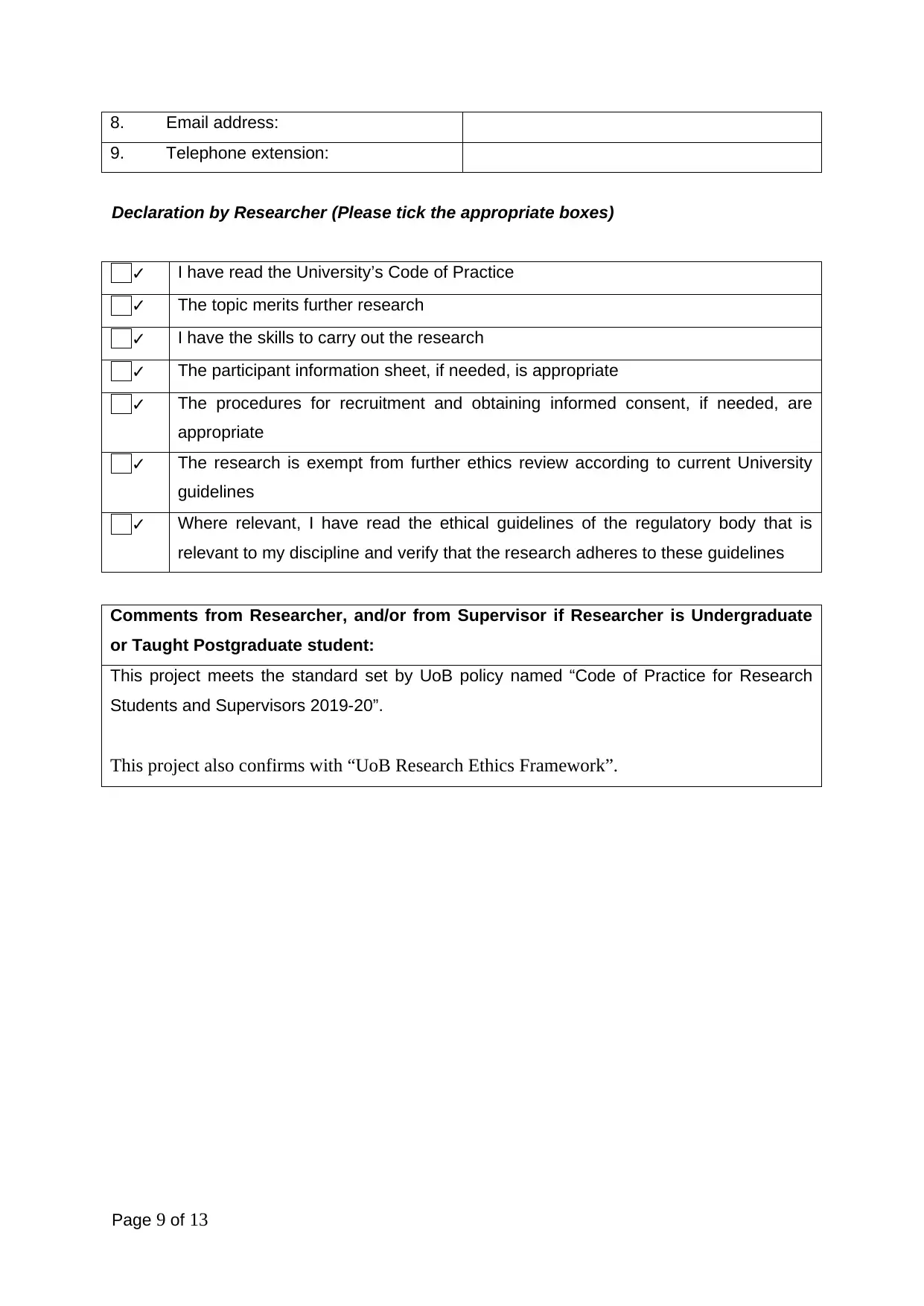
8. Email address:
9. Telephone extension:
Declaration by Researcher (Please tick the appropriate boxes)
✓ I have read the University’s Code of Practice
✓ The topic merits further research
✓ I have the skills to carry out the research
✓ The participant information sheet, if needed, is appropriate
✓ The procedures for recruitment and obtaining informed consent, if needed, are
appropriate
✓ The research is exempt from further ethics review according to current University
guidelines
✓ Where relevant, I have read the ethical guidelines of the regulatory body that is
relevant to my discipline and verify that the research adheres to these guidelines
Comments from Researcher, and/or from Supervisor if Researcher is Undergraduate
or Taught Postgraduate student:
This project meets the standard set by UoB policy named “Code of Practice for Research
Students and Supervisors 2019-20”.
This project also confirms with “UoB Research Ethics Framework”.
Page 9 of 13
9. Telephone extension:
Declaration by Researcher (Please tick the appropriate boxes)
✓ I have read the University’s Code of Practice
✓ The topic merits further research
✓ I have the skills to carry out the research
✓ The participant information sheet, if needed, is appropriate
✓ The procedures for recruitment and obtaining informed consent, if needed, are
appropriate
✓ The research is exempt from further ethics review according to current University
guidelines
✓ Where relevant, I have read the ethical guidelines of the regulatory body that is
relevant to my discipline and verify that the research adheres to these guidelines
Comments from Researcher, and/or from Supervisor if Researcher is Undergraduate
or Taught Postgraduate student:
This project meets the standard set by UoB policy named “Code of Practice for Research
Students and Supervisors 2019-20”.
This project also confirms with “UoB Research Ethics Framework”.
Page 9 of 13
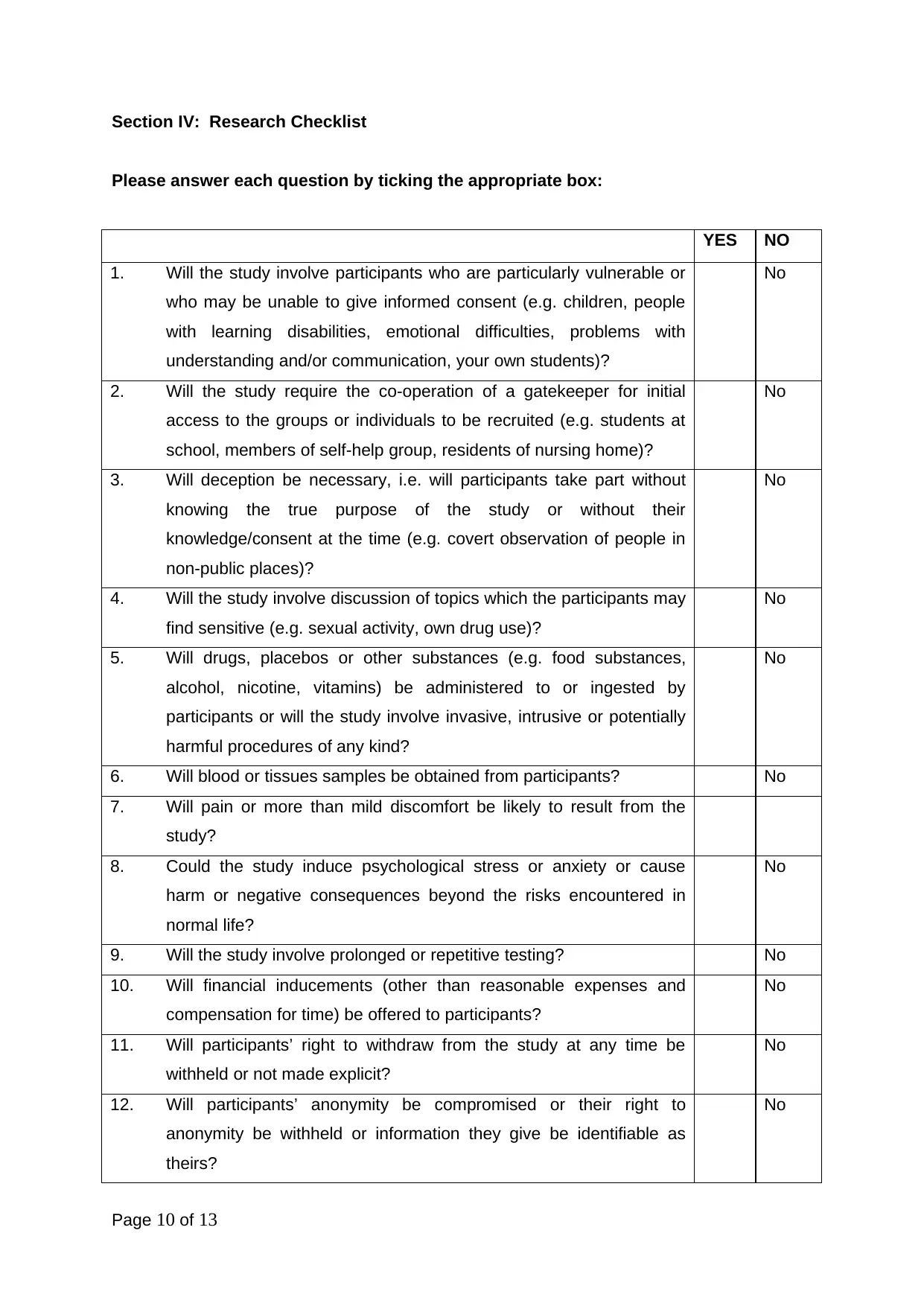
Section IV: Research Checklist
Please answer each question by ticking the appropriate box:
YES NO
1. Will the study involve participants who are particularly vulnerable or
who may be unable to give informed consent (e.g. children, people
with learning disabilities, emotional difficulties, problems with
understanding and/or communication, your own students)?
No
2. Will the study require the co-operation of a gatekeeper for initial
access to the groups or individuals to be recruited (e.g. students at
school, members of self-help group, residents of nursing home)?
No
3. Will deception be necessary, i.e. will participants take part without
knowing the true purpose of the study or without their
knowledge/consent at the time (e.g. covert observation of people in
non-public places)?
No
4. Will the study involve discussion of topics which the participants may
find sensitive (e.g. sexual activity, own drug use)?
No
5. Will drugs, placebos or other substances (e.g. food substances,
alcohol, nicotine, vitamins) be administered to or ingested by
participants or will the study involve invasive, intrusive or potentially
harmful procedures of any kind?
No
6. Will blood or tissues samples be obtained from participants? No
7. Will pain or more than mild discomfort be likely to result from the
study?
8. Could the study induce psychological stress or anxiety or cause
harm or negative consequences beyond the risks encountered in
normal life?
No
9. Will the study involve prolonged or repetitive testing? No
10. Will financial inducements (other than reasonable expenses and
compensation for time) be offered to participants?
No
11. Will participants’ right to withdraw from the study at any time be
withheld or not made explicit?
No
12. Will participants’ anonymity be compromised or their right to
anonymity be withheld or information they give be identifiable as
theirs?
No
Page 10 of 13
Please answer each question by ticking the appropriate box:
YES NO
1. Will the study involve participants who are particularly vulnerable or
who may be unable to give informed consent (e.g. children, people
with learning disabilities, emotional difficulties, problems with
understanding and/or communication, your own students)?
No
2. Will the study require the co-operation of a gatekeeper for initial
access to the groups or individuals to be recruited (e.g. students at
school, members of self-help group, residents of nursing home)?
No
3. Will deception be necessary, i.e. will participants take part without
knowing the true purpose of the study or without their
knowledge/consent at the time (e.g. covert observation of people in
non-public places)?
No
4. Will the study involve discussion of topics which the participants may
find sensitive (e.g. sexual activity, own drug use)?
No
5. Will drugs, placebos or other substances (e.g. food substances,
alcohol, nicotine, vitamins) be administered to or ingested by
participants or will the study involve invasive, intrusive or potentially
harmful procedures of any kind?
No
6. Will blood or tissues samples be obtained from participants? No
7. Will pain or more than mild discomfort be likely to result from the
study?
8. Could the study induce psychological stress or anxiety or cause
harm or negative consequences beyond the risks encountered in
normal life?
No
9. Will the study involve prolonged or repetitive testing? No
10. Will financial inducements (other than reasonable expenses and
compensation for time) be offered to participants?
No
11. Will participants’ right to withdraw from the study at any time be
withheld or not made explicit?
No
12. Will participants’ anonymity be compromised or their right to
anonymity be withheld or information they give be identifiable as
theirs?
No
Page 10 of 13
Secure Best Marks with AI Grader
Need help grading? Try our AI Grader for instant feedback on your assignments.
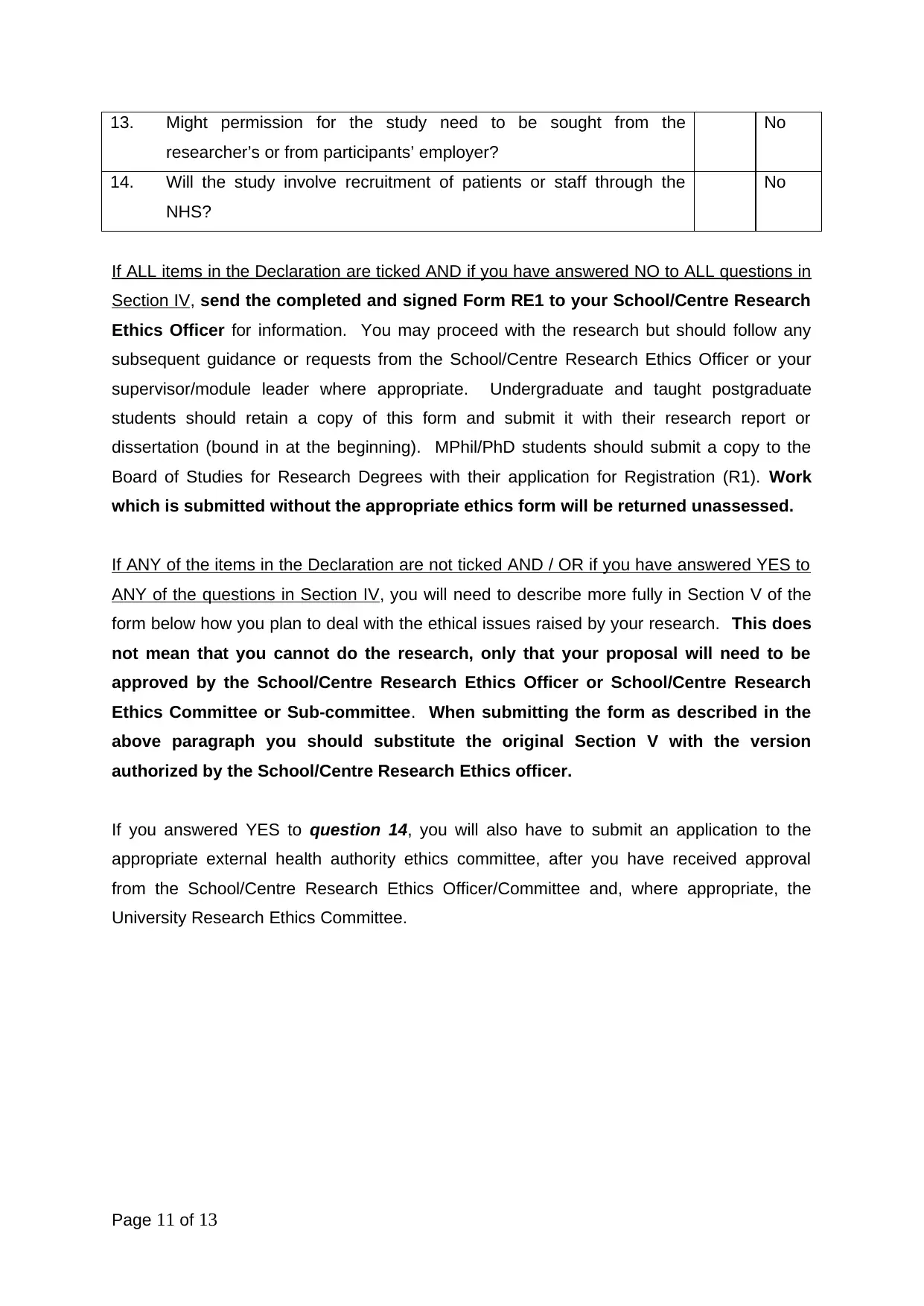
13. Might permission for the study need to be sought from the
researcher’s or from participants’ employer?
No
14. Will the study involve recruitment of patients or staff through the
NHS?
No
If ALL items in the Declaration are ticked AND if you have answered NO to ALL questions in
Section IV, send the completed and signed Form RE1 to your School/Centre Research
Ethics Officer for information. You may proceed with the research but should follow any
subsequent guidance or requests from the School/Centre Research Ethics Officer or your
supervisor/module leader where appropriate. Undergraduate and taught postgraduate
students should retain a copy of this form and submit it with their research report or
dissertation (bound in at the beginning). MPhil/PhD students should submit a copy to the
Board of Studies for Research Degrees with their application for Registration (R1). Work
which is submitted without the appropriate ethics form will be returned unassessed.
If ANY of the items in the Declaration are not ticked AND / OR if you have answered YES to
ANY of the questions in Section IV, you will need to describe more fully in Section V of the
form below how you plan to deal with the ethical issues raised by your research. This does
not mean that you cannot do the research, only that your proposal will need to be
approved by the School/Centre Research Ethics Officer or School/Centre Research
Ethics Committee or Sub-committee. When submitting the form as described in the
above paragraph you should substitute the original Section V with the version
authorized by the School/Centre Research Ethics officer.
If you answered YES to question 14, you will also have to submit an application to the
appropriate external health authority ethics committee, after you have received approval
from the School/Centre Research Ethics Officer/Committee and, where appropriate, the
University Research Ethics Committee.
Page 11 of 13
researcher’s or from participants’ employer?
No
14. Will the study involve recruitment of patients or staff through the
NHS?
No
If ALL items in the Declaration are ticked AND if you have answered NO to ALL questions in
Section IV, send the completed and signed Form RE1 to your School/Centre Research
Ethics Officer for information. You may proceed with the research but should follow any
subsequent guidance or requests from the School/Centre Research Ethics Officer or your
supervisor/module leader where appropriate. Undergraduate and taught postgraduate
students should retain a copy of this form and submit it with their research report or
dissertation (bound in at the beginning). MPhil/PhD students should submit a copy to the
Board of Studies for Research Degrees with their application for Registration (R1). Work
which is submitted without the appropriate ethics form will be returned unassessed.
If ANY of the items in the Declaration are not ticked AND / OR if you have answered YES to
ANY of the questions in Section IV, you will need to describe more fully in Section V of the
form below how you plan to deal with the ethical issues raised by your research. This does
not mean that you cannot do the research, only that your proposal will need to be
approved by the School/Centre Research Ethics Officer or School/Centre Research
Ethics Committee or Sub-committee. When submitting the form as described in the
above paragraph you should substitute the original Section V with the version
authorized by the School/Centre Research Ethics officer.
If you answered YES to question 14, you will also have to submit an application to the
appropriate external health authority ethics committee, after you have received approval
from the School/Centre Research Ethics Officer/Committee and, where appropriate, the
University Research Ethics Committee.
Page 11 of 13
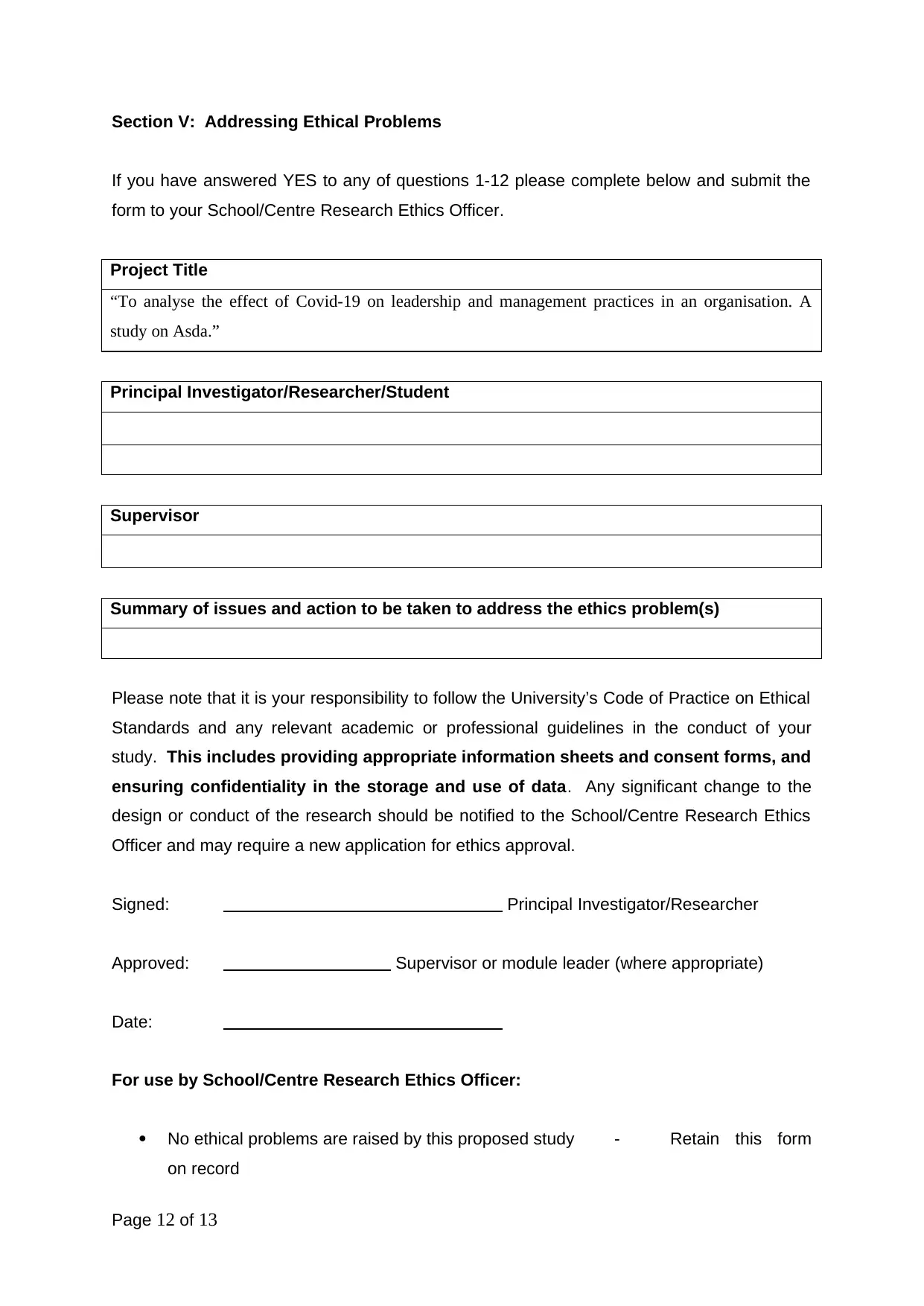
Section V: Addressing Ethical Problems
If you have answered YES to any of questions 1-12 please complete below and submit the
form to your School/Centre Research Ethics Officer.
Project Title
“To analyse the effect of Covid-19 on leadership and management practices in an organisation. A
study on Asda.”
Principal Investigator/Researcher/Student
Supervisor
Summary of issues and action to be taken to address the ethics problem(s)
Please note that it is your responsibility to follow the University’s Code of Practice on Ethical
Standards and any relevant academic or professional guidelines in the conduct of your
study. This includes providing appropriate information sheets and consent forms, and
ensuring confidentiality in the storage and use of data. Any significant change to the
design or conduct of the research should be notified to the School/Centre Research Ethics
Officer and may require a new application for ethics approval.
Signed: Principal Investigator/Researcher
Approved: Supervisor or module leader (where appropriate)
Date:
For use by School/Centre Research Ethics Officer:
No ethical problems are raised by this proposed study - Retain this form
on record
Page 12 of 13
If you have answered YES to any of questions 1-12 please complete below and submit the
form to your School/Centre Research Ethics Officer.
Project Title
“To analyse the effect of Covid-19 on leadership and management practices in an organisation. A
study on Asda.”
Principal Investigator/Researcher/Student
Supervisor
Summary of issues and action to be taken to address the ethics problem(s)
Please note that it is your responsibility to follow the University’s Code of Practice on Ethical
Standards and any relevant academic or professional guidelines in the conduct of your
study. This includes providing appropriate information sheets and consent forms, and
ensuring confidentiality in the storage and use of data. Any significant change to the
design or conduct of the research should be notified to the School/Centre Research Ethics
Officer and may require a new application for ethics approval.
Signed: Principal Investigator/Researcher
Approved: Supervisor or module leader (where appropriate)
Date:
For use by School/Centre Research Ethics Officer:
No ethical problems are raised by this proposed study - Retain this form
on record
Page 12 of 13
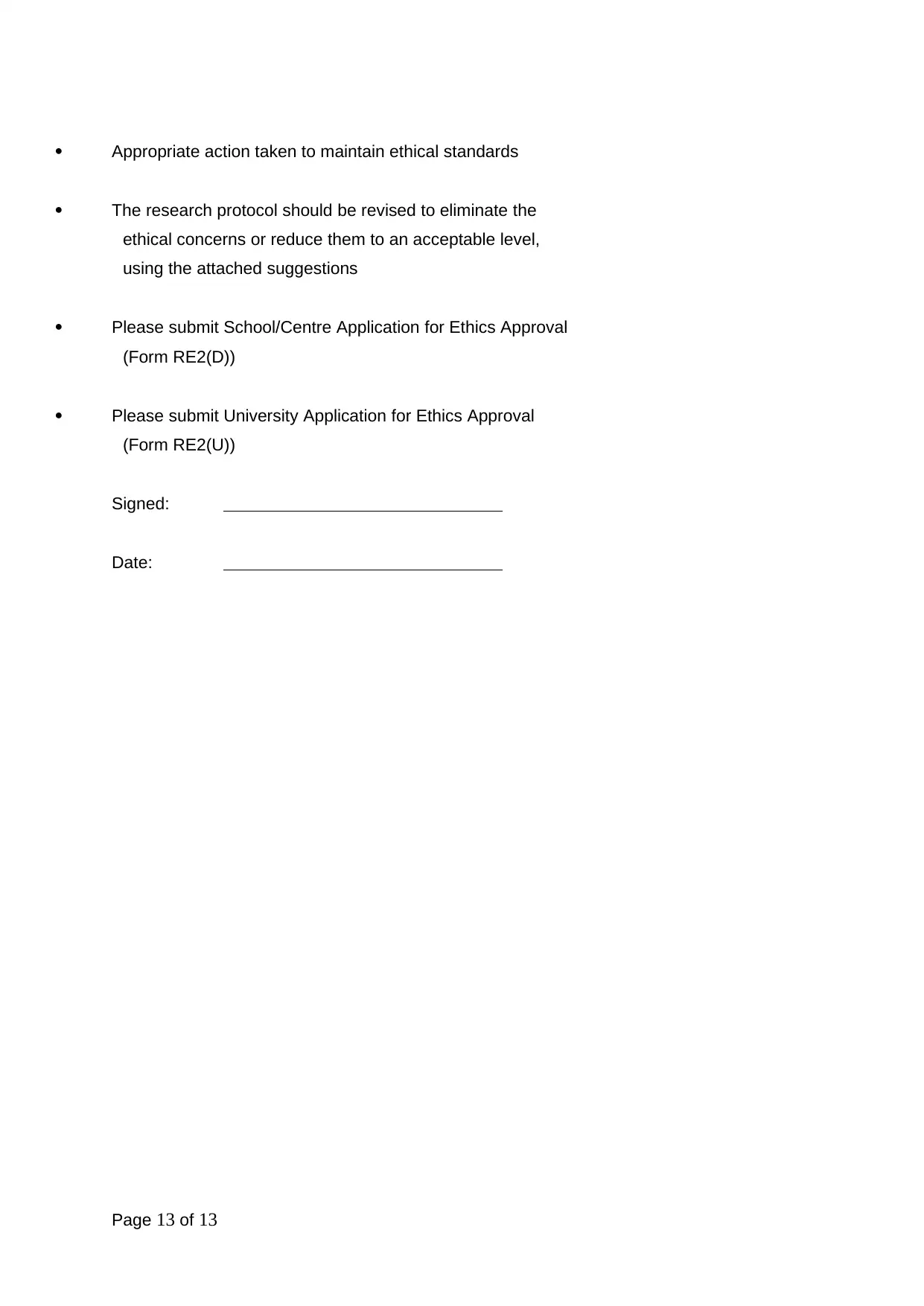
Appropriate action taken to maintain ethical standards
The research protocol should be revised to eliminate the
ethical concerns or reduce them to an acceptable level,
using the attached suggestions
Please submit School/Centre Application for Ethics Approval
(Form RE2(D))
Please submit University Application for Ethics Approval
(Form RE2(U))
Signed:
Date:
Page 13 of 13
The research protocol should be revised to eliminate the
ethical concerns or reduce them to an acceptable level,
using the attached suggestions
Please submit School/Centre Application for Ethics Approval
(Form RE2(D))
Please submit University Application for Ethics Approval
(Form RE2(U))
Signed:
Date:
Page 13 of 13
1 out of 13
Related Documents
Your All-in-One AI-Powered Toolkit for Academic Success.
+13062052269
info@desklib.com
Available 24*7 on WhatsApp / Email
![[object Object]](/_next/static/media/star-bottom.7253800d.svg)
Unlock your academic potential
© 2024 | Zucol Services PVT LTD | All rights reserved.





